George H.W. Bush made many mistakes. America must talk about them.
Grappling with the complicated legacy of an imperfect president


A free daily email with the biggest news stories of the day – and the best features from TheWeek.com
You are now subscribed
Your newsletter sign-up was successful
Upon the news of former President George H.W. Bush's death, tributes and discussions of his legacy quickly emerged. It didn't take long, however, to notice a dichotomy in these remembrances: One narrative told the story of a politician who prized decency and manners, one who could and did reach across the aisle to get stuff done, and who even made friends with the Democrat who took the White House away from him: This was the story, mostly, that led the front pages of The Washington Post and The New York Times.
And then there was the other narrative, about a politician who used racism to gain office, who failed to take a stand against the extreme elements that took over his party — and who, among his many other sins, was embarrassed in his final years by allegations he'd groped young women.
One narrative made Bush a kind of civic hero. The other, a villain. Both versions were true.
The Week
Escape your echo chamber. Get the facts behind the news, plus analysis from multiple perspectives.

Sign up for The Week's Free Newsletters
From our morning news briefing to a weekly Good News Newsletter, get the best of The Week delivered directly to your inbox.
From our morning news briefing to a weekly Good News Newsletter, get the best of The Week delivered directly to your inbox.
There was a time when the death of a president was treated mostly respectfully, even worshipfully: Former President Herbert Hoover led the country as it plunged into the Great Depression, but that extremely salient fact wasn't mentioned until the eighth paragraph of his New York Times obituary in 1964 — and only after the piece first praised him as an exemplar of "rugged individualism."
This kind generous white-washing of a late president's sins in office doesn't really happen anymore; their mistakes and downfalls are laid bare for all to see and scrutinize. But that's not a bad thing.
"It seems more than appropriate that we remember politicians for the totality of their public life," the writer Clint Smith tweeted on Sunday. "It's not a matter of slandering someone after they've passed, it's a matter of being honest about both the good things they might have done in addition to the real harm they caused."
The stories we tell ourselves about the past, he added, influence how we shape our future. "Failing to tell the full story of those in public life once their lives have ended leads to revisionist history," Smith wrote, and "that has a material impact on the way we construct public policy."
A free daily email with the biggest news stories of the day – and the best features from TheWeek.com
Still, we live in a culture where it still feels taboo to speak ill of the newly dead. So why are we so willing to do it in the case of a former commander in chief?
There are two answers. The first is that being president of the United States involves making moral compromises, even on the best day. Throw in the ambition it takes to attain the office, and nobody comes out of the process unmuddied. Especially since the end of World War II, the United States has essentially been an imperial power — possessing both the ability and the will to reach around the world to affect events and attempt to bend history in its favor. It doesn't always work out the way we'd imagined: In Vietnam, Iraq, and numerous other countries, we've helped create disasters that killed hundreds of thousands of people and harmed the lives of countless others. As president in these circumstances, it's hard to be a hero when you're the most powerful human on Earth and yet you muck it up so badly and so frequently.
Even the best-intentioned presidents go awry. After George W. Bush's failures, Barack Obama came into office promising a more modest approach to the world. He ended up ordering drone attacks that killed civilians, oversaw the assassination of an American abroad, used mass deportation to try to bargain immigration policy with Republicans, and was in charge of the National Security Agency apparatus that vacuums up huge amounts of personal data from people all over the world. Obama is a hero to many American liberals, but for many others still, his presidency was a horror show.
The second answer is that these days, the sins of a world leader are much harder to hide than in the past. Everybody has a megaphone. History used to be written by and for the elites, but thanks in part to the internet, we can see more than ever how the actions of "Great Men" affect people at the bottom of the power pyramid — and, if we're listening, are made to understand why it matters. Thirty years ago, for example, AIDS activists had to chain themselves to the balcony of the New York Stock Exchange to draw attention to how the government under Bush and Ronald Reagan was failing them; these days, that narrative is a headline on HuffPost.
Nobody, not even a relatively kindly president, gets to escape this truth. Mostly, that's a good thing. We can't begin to fix our collective mistakes, Philly.com's Will Bunch writes, "until we start telling the truth about our history."
But the danger is that we too heartily embrace cynicism. The most famous intellectual case to elect Donald Trump, after all, suggested he might well destroy the country. In the absence of heroes to lead the country, some folks have opted to vote for outright villainy. That's a horrible idea.
Where does that leave us when it comes to the legacy of George H.W. Bush? Well, he was the Willie Horton candidate — and the leader who signed the Americans with Disabilities Act. He helped cover up the Iran-Contra scandal — and was the last Republican president to take environmental concerns seriously. The list of pros and cons is endless. There are a lot of truths about George H.W. Bush, and we need to hear all of them.
Joel Mathis is a writer with 30 years of newspaper and online journalism experience. His work also regularly appears in National Geographic and The Kansas City Star. His awards include best online commentary at the Online News Association and (twice) at the City and Regional Magazine Association.
-
 How the FCC’s ‘equal time’ rule works
How the FCC’s ‘equal time’ rule worksIn the Spotlight The law is at the heart of the Colbert-CBS conflict
-
 What is the endgame in the DHS shutdown?
What is the endgame in the DHS shutdown?Today’s Big Question Democrats want to rein in ICE’s immigration crackdown
-
 ‘Poor time management isn’t just an inconvenience’
‘Poor time management isn’t just an inconvenience’Instant Opinion Opinion, comment and editorials of the day
-
 The billionaires’ wealth tax: a catastrophe for California?
The billionaires’ wealth tax: a catastrophe for California?Talking Point Peter Thiel and Larry Page preparing to change state residency
-
 Bari Weiss’ ‘60 Minutes’ scandal is about more than one report
Bari Weiss’ ‘60 Minutes’ scandal is about more than one reportIN THE SPOTLIGHT By blocking an approved segment on a controversial prison holding US deportees in El Salvador, the editor-in-chief of CBS News has become the main story
-
 Has Zohran Mamdani shown the Democrats how to win again?
Has Zohran Mamdani shown the Democrats how to win again?Today’s Big Question New York City mayoral election touted as victory for left-wing populists but moderate centrist wins elsewhere present more complex path for Democratic Party
-
 Millions turn out for anti-Trump ‘No Kings’ rallies
Millions turn out for anti-Trump ‘No Kings’ ralliesSpeed Read An estimated 7 million people participated, 2 million more than at the first ‘No Kings’ protest in June
-
 Ghislaine Maxwell: angling for a Trump pardon
Ghislaine Maxwell: angling for a Trump pardonTalking Point Convicted sex trafficker's testimony could shed new light on president's links to Jeffrey Epstein
-
 Obama, Bush and Bono eulogize USAID on final day
Obama, Bush and Bono eulogize USAID on final daySpeed Read The US Agency for International Development, a humanitarian organization, has been gutted by the Trump administration
-
 The last words and final moments of 40 presidents
The last words and final moments of 40 presidentsThe Explainer Some are eloquent quotes worthy of the holders of the highest office in the nation, and others... aren't
-
 The JFK files: the truth at last?
The JFK files: the truth at last?In The Spotlight More than 64,000 previously classified documents relating the 1963 assassination of John F. Kennedy have been released by the Trump administration
